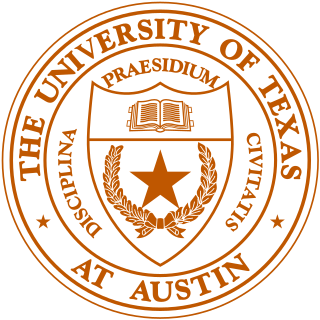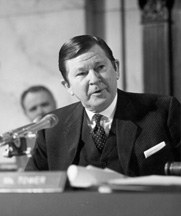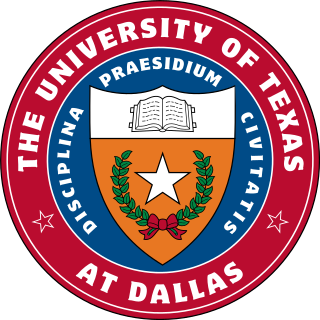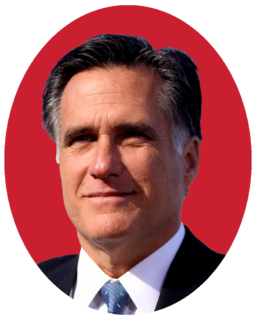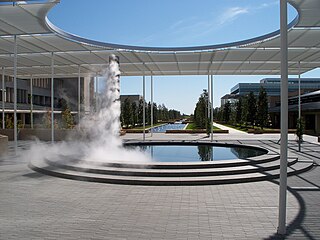Political life
O'Donnell was a Texas delegate to the 1960 Republican National Convention in Chicago, which nominated the Nixon-Lodge ticket. He was an alternate delegate to the New Orleans convention in 1988, which nominated George Herbert Walker Bush and Dan Quayle. [10] In the fall of 1960, O'Donnell was the Dallas County Republican chairman [11] and compiled a record of considerable success. His responsibility was to recruit party workers to get out the vote for Nixon-Lodge and John Tower for the U.S. Senate, with whom O'Donnell was politically close. [12] [13]
In 1963, prior to the assassination of John F. Kennedy, as the state party chairman O'Donnell tried to convince the Republican National Committee to host the 1964 convention in Dallas, but received little support in his endeavor. The Dallas Chamber of Commerce doubted that the $500,000 needed to make a serious bid for the convention would be cost-effective. O'Donnell said he would try again in 1968 if his 1964 bid failed. [14] It was not until 1984 that the GOP held its convention in Dallas, when delegates renominated the Reagan-Bush ticket.
O'Donnell's friend and political ally, Jack Crichton, the 1964 Texas Republican gubernatorial nominee against the later Republican convert John B. Connally, Jr., describes O'Donnell as a "skilled organizer who located people around the nation who were in a position to promote the Goldwater cause." The director of the committee was New York City attorney F. Clifton White. [15] After his nomination on July 15, 1964, at the Cow Palace in San Francisco, California, Goldwater, in Crichton's words, "with boundless energy campaigned vigorously selling his belief in less government control, supported private enterprise, and increasing capital investment, [and] halting the drift toward socialism and increasing our national debt." [16]
O'Donnell served on the 1964 Republican national platform committee. Another Texan, Albert Bel Fay of Houston, was a member of the credentials committee in 1964 and was thereafter the Texas Republican national committeeman. In 1964, O'Donnell supported George H. W. Bush of Houston in his losing race for the U. S. Senate, first in the primary against Jack Cox, the 1962 Republican gubernatorial nominee, and then in the general election against the Democratic incumbent, Ralph Yarborough. [17] The 1964 general election was a Republican disaster in Texas; with the defeats of U.S. Representatives Bruce Alger and Ed Foreman, the party was reduced to a single seat held by Frank Kell Cahoon of Midland in the 150-member Texas House of Representatives. Republican John Tower continued to hold the other Senate seat once filled by U.S. President Lyndon B. Johnson. In 1968, Chairman O'Donnell led the Nixon supporters [18] in his state at the national convention in Miami Beach, Florida. This placed him in conflict once again with Jack Cox, the leader of the burgeoning forces backing Ronald Reagan in his first brief bid for the nomination. The 1968 Republican defeats in Texas, Hubert Humphrey won the state's electoral votes, and Conservative Democrat Preston Smith was elected governor over Republican Paul Eggers, led to calls to replace O'Donnell as chairman in 1969. [13]
By 1972, the Republicans hoped once more to rebound in Texas. Albert Fay lost the Republican primary for governor to former Democrat State Senator Henry Grover, also of Houston. In turn, Grover was defeated in a fairly close vote by the Democrat Dolph Briscoe, but John Tower won a third term in the Senate. [19]
In 1978, he was a key advisor to the narrow election of Bill Clements, the Dallas industrialist who became the first Republican governor of Texas since Reconstruction. [1] In 1987, still an advisor to Clements in the first year of Clements' second nonconsecutive term, O'Donnell convinced the governor to abandon an unpopular proposal for higher taxes. [20]
Over the years, O'Donnell has donated to various Republican candidates for office throughout the nation, including $245,000 between 2001 and 2010 to retiring Texas Governor Rick Perry [21] In 2011, O'Donnell, who usually keeps a low public profile, criticized some of Perry's education proposals as "absurd", including replacing tenured faculty with lower-paid instructors, tying faculty bonuses to student evaluation of instruction, establishing a new accreditation of universities by an agency yet to be created, and the offering of an undergraduate degree that costs no more than $10,000. [22]
In 2013, the O'Donnell Foundation named Dallas attorney Tom Luce as its chief executive officer. Formerly the chief of staff to the Texas Select Committee on Public Education, Luce was named in 2005 as the assistant United States Secretary of Education under Margaret Spellings by U.S. President George W. Bush. He remains chairman of the National Math and Science Initiative. [23] In the spring of 1990, Luce was an unsuccessful candidate for the Republican gubernatorial nomination, won by Clayton W. Williams, Jr., of Midland, who then lost the general election to the Democrat Ann W. Richards.
Former UT President Larry Faulkner calls O'Donnell:
My candidate for the living Texan with the greatest impact on modern Texas. He built the Republican Party of Texas from zero, essentially, to the point where it won every statewide office. He has focused strongly on improvement of the universities, the schools, and moving education into a modern form at a modern level. And he has been interested in transformation of the economy and has done all he can to support bringing high-technology businesses into the state. [1]
